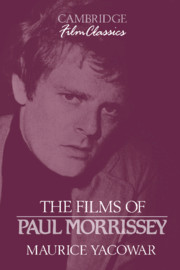Summary
Warhol's coterie considered Morrissey a sellout because he won the Factory its first (and only) large audience. But Morrissey's narrative orthodoxy did not make him a commercial director. On the contrary, his cinema rejects the commercial processes, both in its style and in its content.
The Flesh trilogy documents America's libertarianism with more realism and irony than even such respected commercial equivalents as Midnight Cowboy and Easy Rider. Morrissey denies the viewer any comfortable identification and any utopian possibility from the liberated libido. In his view, people who are freed from a social system are its most pathetic victims. For they become most easily commodified, turned into products for sale and trade. The sucking that the Dallesandro characters sell as sex becomes the sucking of the very lifeblood in the Dracula film. The sex bought and sold in the Flesh trilogy becomes the synthetic slaves in Frankenstein, then the synthetic “families,” whether Menudo or Rita's, in Mixed Blood. Dracula's would-be brides are up-market versions of the street sex merchants, elevated in L'Amour but dropped in Madame Wang's, and more debased in Forty-Deuce. Sex and self seem opposed integrities in Women in Revolt, and indeed wherever sexuality defines the characters' relationships or their chosen form of freedom.
Morrissey deals with the commodity of cinema in the form of his films as well as in their content. Insofar as his films evoke a genre, they suggest that he might conform to some formal conventions.
- Type
- Chapter
- Information
- The Films of Paul Morrissey , pp. 120 - 124Publisher: Cambridge University PressPrint publication year: 1993



